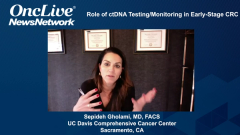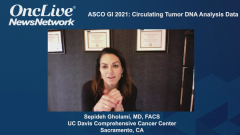
ASCO GI 2021: MRD Detection With ctDNA From Assays
Expert physicians discuss data presented at the ASCO GI (American Society of Clinical Oncology Gastrointestinal Cancers Symposium) 2021 annual meeting, regarding minimal residual disease (MRD) detection with ctDNA (circulating tumor DNA) from personalized assays in stage II and III patients with colorectal cancer.
Christopher Lieu, MD: I’ll talk about another abstract utilizing ctDNA [circulating tumor DNA] in colorectal cancer. It supports what Dr Gholami talked about in regard to the abstract that she discussed concerning the TRACC study. This abstract is titled “Circulating Tumor DNA Analysis for the Assessment of Recurrence Risk, Benefit of Adjuvant Therapy, and Early Relapse Detection After Treatment in Colorectal Cancer Patients.” This was presented at the oral abstract session at ASCO GI [American Society of Clinical Oncology Gastrointestinal Cancers Symposium].
The basic study design was essentially similar: There were 265 patients with stage I through III colorectal cancer, but most were stage II or III. CtDNA was tested using the Signatera assay, which is tumor-based profiling—and Dr Gholami had mentioned that test previously. Only 9% of the patients were ctDNA positive after surgery, and 75% of those patients relapsed. Some of the prior studies preceding the 2 abstracts that Dr Gholami and I are discussing showed basically close to 100%, if not 100% relapse rate.
The authors did note that 5 of 20 patients who did not relapse did receive adjuvant chemotherapy, and that is an interesting finding—that 5 of 20 who did not relapse but were ctDNA positive did receive adjuvant chemotherapy. We should also make it clear that the study doesn’t necessarily prove the impact of chemotherapy in that patient population. It can’t prove causality that those patients are now alive and disease-free because of adjuvant chemotherapy.
Just as Dr Gholami said, the time from the detection of ctDNA to radiographically visible disease was 8 months, which is an incredible amount of lead time. It should be noted that if you were ctDNA negative postoperatively, 13% of those patients relapsed. If you did longitudinal monitoring—Dr Gholami mentioned this—if you do this test on a regular basis every 3 months, the relapse rate in patients who were consistently and persistently ctDNA negative was only 3.4%. That shows the impact of longitudinal testing and its impact on the overall sensitivity of the assay.
When you think about these data, along with the data that Dr Gholami presented, the main implication is that this adds to our overall understanding of how powerful of a prognostic signal ctDNA is—the presence of it or even the absence of it, particularly if you’re testing consistently over time. What this study doesn’t tell us is whether adjuvant therapy helps the patients who they studied. And what we need to know is the impact of our therapies on this patient population and whether ctDNA can be used to guide treatment in a way that improves overall survival. That’s the key, because it’s always fine to get information. But if that information is actionable, then that’s a powerful test. We’re getting there, but we really need those prospective clinical trials to answer that question. Dr Gholami, any comments about that?
Sepideh Gholami, MD, FACS: You’re hitting up all the great points. It is a predictor, and can you really change survival benefit. That is ultimately what matters to patients, right? That’s the next step, and it would be really cool if, in the future, we could use it as an end point for drug development on larger platforms. You and I see various trials that are presented and discussed, and it’s exciting that the ctDNA discussion is almost included in every single trial that we see.
We’re moving really in the right direction. Colorectal is actually ahead of the game compared with a lot of other solid tumors when it comes to this, not necessarily with all the other things. But when it comes to the ctDNA, we’ve made a lot of progress. It’s really an exciting time. I hope the audience enjoyed listening to this and also really does due diligence to look into the details and answer all those questions that our patients have.
Christopher Lieu, MD: I totally agree. From my side, what I want to see in the future is a continuation of the advancement in the technology. The better sensitive these assays become for the detection of ctDNA, the better of a marker it will be. Dr Gholami and I have hit that home more than we probably needed to, but it really is true. We need these prospective clinical trials to tell us if we can ever use these assays to tell us: Maybe we don’t have to give this subset of patients chemotherapy. Maybe this group is the patients who are going to truly benefit from chemotherapy. Better yet, maybe we need to, in some way, escalate our therapy in terms of what we traditionally do. These are all the things we don’t have answers to but we hope to, and this is a rapidly developing field. You’re going to see the landscape change dramatically over the next couple of years. But clinical trials are going to get us to those answers that we desperately need.
Dr Gholami, thank you so much for taking the time. To all of you listening, thanks for taking the time to listen. I hope you all found this helps with your knowledge and your understanding of these assays and their impact on our patients with colorectal cancer. Thank you, everybody, and have a great day.
Transcript Edited for Clarity










































